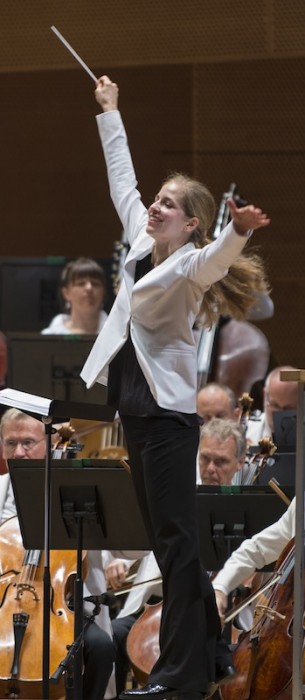Young conductor makes strong Grant Park debut with Bernstein, Franck

When a youthful batonsmith ascends the podium there is invariably a show-me-what-ya-got attitude from veteran cynics, musicians as well as critics. When the conductor is a young, slender, and attractive woman with a flamboyant podium style, the skepticism invariably multiplies threefold.
Karina Canellakis made a strong and impressive local debut Wednesday night at the Grant Park Music Festival. The cool, drizzly evening made for a largely empty lawn but those who stuck around heard inspired performances led by the 34-year-old American conductor.
In her first season as assistant conductor of the Dallas Symphony Orchestra, Canellakis is clearly a musician to be taken seriously. She remains active as a violinist, and Canellakis has sound ideas about the music she directs and the podium skills to convince an orchestra to go along with her.
She displayed an exceptionally idiomatic feeling for music of Leonard Bernstein, as was shown in Wednesday’s exuberant performance of Fancy Free. The 1944 ballet about three sailors on leave in New York was Bernstein’s first collaboration with choreographer Jerome Robbins, and gave the 25-year-old composer his first smash success. In less than six months, Bernstein and Robbins would expand the scenario into the musical On the Town, and their partnership would find its highest achievement a few years later with West Side Story.
Canellakis gave us the complete 25-minute ballet, the first time Fancy Free has been heard in its entirety at the lakefront festival. There are fleeting pre-echoes of West Side Story in this early work yet Fancy Free is one of Bernstein’s first truly great scores and deserves to be more frequently heard. The music is thoroughly imbued with the composer’s fluent mix of jazz and populist dance rhythms with classical sophistication and refinement.
Canellakis led a fizzing, high-stepping performance with a notably sassy “Opening Dance,” ample sexy swagger to “Enter Two Girls,” sensual languor to the “Pas de Deux” and hyped-up testosterone in the “Competition Scene.” While the performance had enormous rhythmic kick, Canellakis also balanced textures artfully in the more delicately scored interludes. Andrea Swan brought uptown swing to the jazzy piano solos and the brass was exceptional as a unit and in their snappy solo moments.
John Adams’ Lollapalooza, which opened the concert, fared less well. Canellakais led a solid if rather literal rendition of Adams’ six-minute curtain-raiser. The raucous results missed most of the rhythmic wit and felt like a run-through that got the short end of rehearsal time.
No such caviling about the evening’s main work, Cesar Franck’s Symphony in D minor. Though the Belgian composer’s sole symphony is not as omnipresent in concert halls as it once was, it remains the most accomplished of Franck’s scant orchestral works.
Canellakis was clearly attuned to Franck’s elusive, uber-chromatic style, and the Lento introduction had a striking sense of searching mystery. The ensuing Allegro was incisive and dramatic, the conductor deftly charting the ebb and flow.
In the Allegretto, Canellakis drew finely nuanced dynamics and transparent textures from the Grant Park players. The final movement provided the requisite payoff, surging and energized yet firmly controlled, the conductor minding the “non troppo” marking.
Karina Cannelakis is the real thing. Let’s hope we see her again in Chicago soon.
The Grant Park Music Festival will present “A Sondheim Celebration” 8 p.m. Friday and Saturday at the Pritzker Pavilion. gpmf.org.
Posted in Performances


